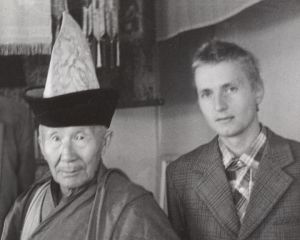Buddhist Vocabulary: Empowerment
Word origins:
Sanskrit: abhiṣeka to anoint or consecrate
Tibetan: wang kur (dbang bskur) to confer initiation/empowerment
wang (dbang): power, force
kur (bskur): send, give, bestow
Empowerment is an initiation ritual that introduces one to a specific Vajrayana practice and allows them to engage in the practice.
In an empowerment, the vajra master transmits the realization of a particular practice to the initiate. This is not a bestowing of something to the initiate that they do not have. An empowerment activates a quality that is dormant. The vajra master’s transmission wakes up an innate quality to which the initiate does not have access because the quality is obscured by habitual patterns.
An initiation allows one to enter the mandala and learn the visualizations, mantras, and mudras associated with a particular practice.An empowerment is one of three transmissions required for one to have permission to engage in a Vajrayana practice.
Three transmissions:
wang: transmission of the realization of the practice one wishes to undertake.
lung: reading transmission that allows one to read the text.
tri: the instructions on how to do the practice.
There are four empowerments within an Anuttarayogatantra initiation:
Vase empowerment which relates to a purification of the body, the sense doors, and phenomenal world into nirmanakaya (manifest body of enlightenment).
Secret empowerment which relates to purification of speech into sambhogakaya (body of enjoyment).
Knowledge - wisdom empowerment which relates to purification of the mind into dharmakaya (body of ultimate enlightenment) .
Word empowerment which purifies the above three into the svabhavikakaya (essential body) which is the inseparability of the nirmanakaya, sambhogakaya and dharmakaya.
In order for an empowerment to take place, the two causes and four conditions are necessary:The two causes needed for an empowerment:
Associated cause: the presence of the buddha nature
Cooperative cause: the ritual implements and substances used in the ritual
The four conditions needed for an empowerment:
Causal condition: initiate with faith and intelligence
Dominant condition: fully qualified teacher/vajra master
Objective condition: the vajra master’s knowledge of the ritual
Immediate condition: the previous stage or empowerment which prepares the initiate for each successive stage of practice or of the empowerment.
It is important the vase, secret, knowledge-wisdom, and word empowerments be given in the correct order as each one prepares the ground for the next.
Lama Döndrup has been practicing and studying in the Buddhist tradition since the mid-1990’s. After five years of Theravadin Buddhist training, she immersed herself in the teachings and practices of the Shangpa and Kagyu Vajrayana lineages.
In 2005, she completed a traditional three-year retreat under the guidance of Lama Palden and Lama Drupgyu with the blessing of her root guru, Bokar Rinpoche and was authorized as a lama. Upon her return to Marin County, she began teaching at Sukhasiddhi Foundation.
In January 2020, as Lama Palden’s successor, she stepped into the role of Resident Lama, guiding the Center’s ministerial work. Lama Döndrup’s teaching style is thorough and clear yet with light touch as she supports the natural unfolding of each student’s innate wisdom and compassion.
She aims to preserve the authenticity of the tradition while making the teachings and practices relevant and accessible to the lives of 21st century Westerners.
In addition to her Buddhist practice, Lama Döndrup trained the Ridhwan School’s Diamond Approach for seven years and has a Masters of Fine Arts degree in piano performance. She is an active classical pianist and teacher in the San Francisco Bay Area.
